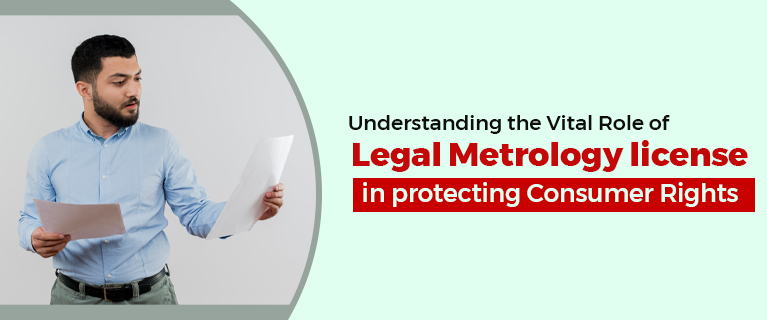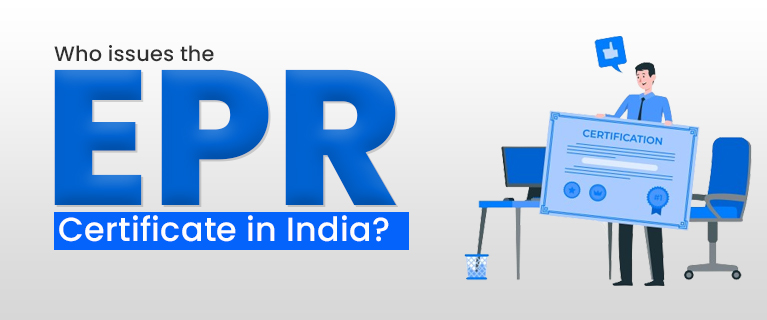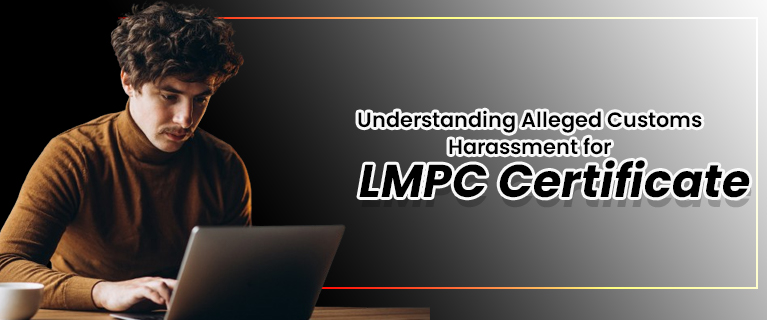Understanding the Vital Role of Legal Metrology license in protecting Consumer Rights
Legal Metrology plays a crucial role in consumer protection by regulating and ensuring the accuracy of measurements in the market, get Legal Metrology license. It is responsible for creating a fair and equitable marketplace where consumers can buy products with confidence. This blog will help you understand what is legal metrology & its department and role in consumer protection.
What does legal metrology mean?
Legal Metrology is the branch of metrology responsible for regulating and enforcing the laws and regulations relating to measurements, measuring instruments, and measurement systems. It is responsible for ensuring accuracy in the measurements of goods and services sold in the market. The Legal Metrology Act, of 2009, was enacted to ensure accurate and transparent measurements in trade and commerce.
Metrology is the name given to the scientific study of measurement. Legal metrology offers standards for the regulation of measures and measuring tools. Legal metrology is essential for fair trade and concurrently protects safety for the public, the environment, consumers, and retailers.
According to the Legal Metrology Act of 2009, all packaged goods sold or distributed in India, including export goods, food items, and consumer products, must have a lmpc certificate issued by the Metrology Department of Consumer Affairs.
Read also this -: Understanding the Different Types of LMPC Certificates | A Comprehensive GuideThe use of weights and measures has expanded as a result of significant improvements in weighing and measuring methods brought about by scientific and technological advances. Get Legal Metrology license now!!!
Legal Metrology Act regulations and rules for getting Legal Metrology license
The 2011 Legal Metrology (General) Rules -
It includes information on roughly 40 various kinds of scales and measuring tools, including electronic scales, weighbridges, fuel pumps, water meters, sphygmomanometers, and clinical thermometers. State Government employees conduct regular examinations of weighing and measuring devices using standard weights and measures, following the procedure provided in the rules.
Regulations for Legal Metrology (Packaged Commodities), 2011 -
Prior to the product being sold, it imposes certain labeling criteria and governs the pre-packed goods in India. Every package must contain the specific declarations listed below to comply with this requirement:
1. The manufacturer, packer, and importer's name and address.
2. country of origin in cases where packages are imported.
3. The commodity's common or generic name is listed on the package.
4. Net quantity is expressed in terms of a regular unit of weight, size, or number.
5. Import, manufacture, and packaging months and years.
6. The maximum sale price, or Maximum Maximum Price (MRP), is Rs. including all taxes.
7. Information on customer care and service.
Model Approval Rules under Legal Metrology Act, 2011 -
As per the Model Approval Rules under Legal Metrology Act, 20011, pre-packaged items must contain affirmations and additional information, apart from standard measures or figures. These rules were created by the Central Government under the Legal Metrology Act of 2009.
It is a framework that the Central Government has established to specify (i) the requirements for base units of measurement and base units of mass, (ii) various standards, and (iii) the intervals for norm verification.
Read also this -: How to Apply LMPC Certificate Online: Step-by-Step GuideRegulations for Legal Metrology (Numeration), 2011 -
This sentence talks about numeration and how to write numbers correctly.
The Rules made by Indian Institute of Legal Metrology in 2011
Under the direction of this agency, the Indian Institute of Legal Metrology in Ranchi serves as a training facility for legal metrology officers employed by Indian states, union territories, and local governments. These rules contain provisions defining the Institute's required activities, the courses that must be taught there, and the requirements for applicants to the Institute.
The 2013 Rules for Legal Metrology (Government-Approved Test Centres) -
The Government Approved Test Centre (GATC) rules the approval of GATCs created by private companies for the State Government Officers' verification of particular weights and measures.
Regarding the verification by a GATC, the weights and measures that are stated by these standards are:
1.Water meter
2. Sphygmomanometer
3. Clinical Thermometer
4. Automatic Rail Weighbridges
5. Tape Measures
6. Load cell
7. Beam Scale
8. Counter Machine
9. Weights of all Categories
10. non-automatic weighing instruments that fall under Accuracy Class-III or Class-III and have a maximum capacity of up to 150kg.
Legal Metrology's Role in Consumer Protection: Get LMPC Certificate
Within the field of metrology, legal metrology deals with the statutory and regulatory issues of measurements and measuring tools. With its functions spanning numerous economic sectors, it is essential for protecting consumers.
1.Protecting Measurement Accuracy:
A key element of trade and commerce is the ability to make precise measurements. They serve as the cornerstone for fair trade procedures, guaranteeing that buyers receive what they paid for. To control and uphold the standards of these measurements, legal metrology enters the picture.
A precise amount of petrol must be delivered by the pump when you purchase it at a petrol station, for instance. Consumers risk paying more for less if this doesn't change. The scales used must give an accurate reading when buying things by weight or volume, such as groceries or beverages. Departments of legal metrology execute laws that call for regular checks and adjustments of these measuring tools. These tests aid in removing the possibility of consumers receiving inferior products as a result of incorrect measurements.
2.Pre-Packaged Goods Verification:
Have you ever wondered whether the weight or volume listed on the packaging of an item you choose off a grocery store shelf is accurate? Around the world, legal metrology divisions make sure that the contents of pre-packaged items match the statements on the packaging.
It's essential to consumer safety that these packaging, whether they contain a can of soda or a bag of chips, contain exactly what they promise. Legal metrology departments conduct sporadic inspections and compare the reported weight or volume to the actual substance. This serves to safeguard customers from dishonest business practices and keep manufacturers honest.
3.Keeping Customers Safe from Overcharging:
Beyond measurement precision and pre-packaged items, Legal Metrology license also significantly contributes to safeguarding customers from overcharging. Laws governing legal metrology aid in price regulation and help to ensure that consumers are not charged more than the MRP. This is crucial for vital commodities because overcharging them might have negative effects on consumers.
4.Making Sure Measuring Equipment Is Safe:
Imagine using a thermometer that is faulty and gives false readings of the temperature. It could result in a wrong diagnosis or course of therapy in addition to endangering your health. The security of measurement devices is essential at this point. Legal metrology makes ensuring that measuring devices, whether they are employed in trade, healthcare, or other sectors of the economy, adhere to safety regulations. Instruments are regularly examined and declared safe for usage. This assures users that the equipment they depend on is secure as well as accurate.
5.Providing Consumers with Correct Information
Consumer protection is built on two pillars: transparency and information accuracy. Customers are entitled to truthful information about the products and services they buy. Manufacturers and service providers are required by legal metrology rules to give consumers with accurate and understandable information. The unit of measurement, as well as the calculating process, must all be obvious and understandable to the general customer when it comes to measures. Giving customers correct information enables them to make wise decisions and safeguards them against deceptive or fraudulent business practices.
6. Protecting consumers' health and safety
Legal Metrology license also plays a crucial role in protecting consumers' health and safety. It ensures that the measurement of harmful substances like pesticides, toxic chemicals, and other hazardous materials is accurate and complies with safety and health standards. Legal Metrology also ensures that the labelling and packaging of such products comply with relevant standards and regulations. This helps consumers to make informed decisions regarding the products they are purchasing, and it protects them from hazardous products that may risk their health and safety.
7.Ensures consumers get the correct quantity
It ensures that consumers receive the correct quantity or weight of products they purchase. The act mandates that all goods sold in the market have to be sold by weight, volume, or length, as stipulated by relevant Indian Standards. All weighing and measuring instruments used for weighing or measuring purposes should be certified by the Legal Metrology Department. This ensures that customers get what they pay for, and it helps to prevent unscrupulous traders and manufacturers from cheating consumers.
8.Acts as an arbiter between customers and traders
Legal Metrology Certificate acts as an arbiter between customers and traders in case of any dispute arising from measurements. The department provides a grievance redressal mechanism for consumers to lodge complaints regarding inaccurate measurements, false advertising, or any other unfair trade practices. The department conducts investigations and takes appropriate action against offenders. Read also this -: Applying for Legal Metrology Registration Online
Purpose of the Legal Metrology Department
The Legal Metrology Department's mandate is to oversee the laws that are established for measurements that must be accurate with respect to actual measurements, instruments used for measurements, instrument reference material, or the measuring framework needed for characterizing, acknowledging, moderating, or imitating a unit of measurement.
Measurement is useful for many different necessities, including the measurement of food sold in markets, the amount of fuel used by vehicles or other machinery, the measurement of distance and temperature, the measurement of workplace commotion, etc.
For instance, the measurement of kilograms in the unit for the quantity for the reference of "Mass" is provided with a specific barrel-shaped structure that is also regarded as a universal principle. While the development of measurement squares for addressing necessary qualities gives the unit of the quantity for the reference of "Length" a specific structure.
The Ministry of Earth Sciences and the Government of India established the Legal Metrology license Department in India to maintain consistency, accuracy, and effective administration of such objectives.
Legal Metrology Department functions for the Economy
According to India's economy, the Legal Metrology Department performs the following duties:
Regulation to prevent insufficient measurement practises indicates a reasonable financial outlay for the customers and saves both the vendor and the customer time.
Controlling any biased or unfair advantages at the start of any trade businesses. It is also beneficial for the consumers, vendors (people who buy products to sell) and sellers of the products, thereby making sure that only fair trade is practiced.
Consumers trust measurements that can be traced and that provide a fundamental framework for stock control because they decrease the onset of any fraudulent actions and boost the effectiveness of the management of the stock control system.
The Legal Metrology Department supports tax administration and revenue collection for the relevant measurements. The amount of goods that are sold, imported, or exported in the market, on bulk commodities like rice, natural gas, gold, lumber, etc., may be subject to such taxes.
Legal metrology in India is governed by internationally agreed-upon standards, giving trade business owners certainty and confidence. This guarantees both national and international economic growth and promotes involvement in international trade.
This department oversees a variety of regulations, including those pertaining to the environment, workplace health and safety, traffic control, air traffic control, etc., which fosters the promotion of trustworthy and good governance.
Legal Metrology Department functions for the Society
According to Indian residents, the Legal Metrology Department performs the duties listed below:
The Legal Metrology Department supports the calibration of precise pharmaceutical and medical products, assisting in the exact diagnosis required for the necessary medical treatment. Additionally aids in the calibration of food product chemical and biological testing.
By preventing and minimising harm related to ecological risk factors, this department aids in the monitoring of the preservation of the environment. The decisions made in relation to ecological risk factors may include elements like control over fishery resources, noise control of industrial production, air crafts, etc., testing for water, air, and soil pollution, metals, pesticides, etc., and identification of the percentage of environmentally hazardous factors.
This department supports the upkeep of traffic control safety regulations, resulting in a decrease in accidents, fatalities, and injuries.
Read also this -: Apply for WPC Certificate: A Step-by-Step GuideConclusion
In conclusion, the Legal Metrology Department plays an important role in consumer protection by ensuring transparency, accuracy, and fairness in trade and commerce. It is essential for all stakeholders, including manufacturers, traders, and consumers, to adhere to Legal Metrology laws and regulations to promote a fair and equitable marketplace that is beneficial to all. Must enroll to get lmpc certificate now !!!










